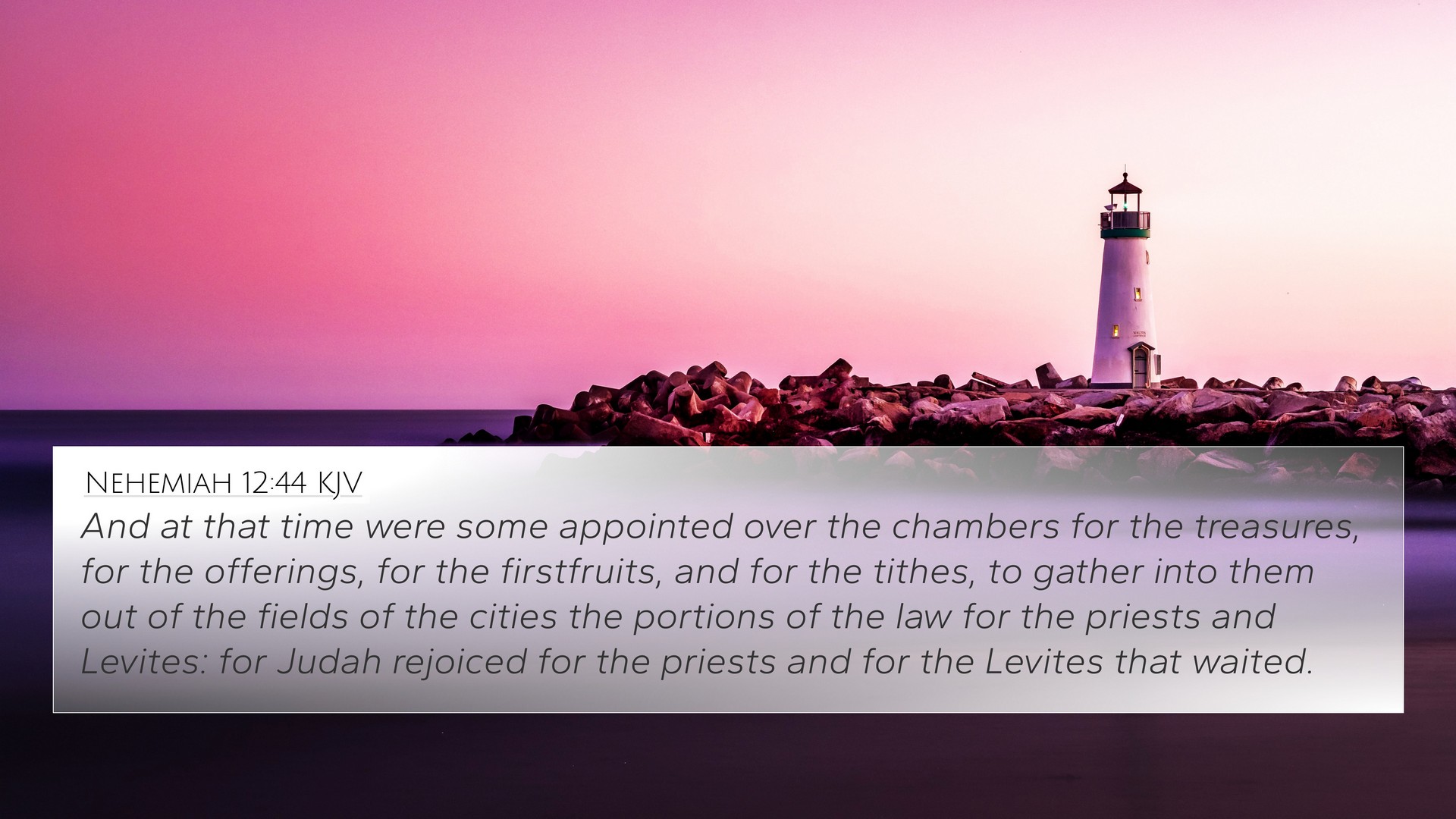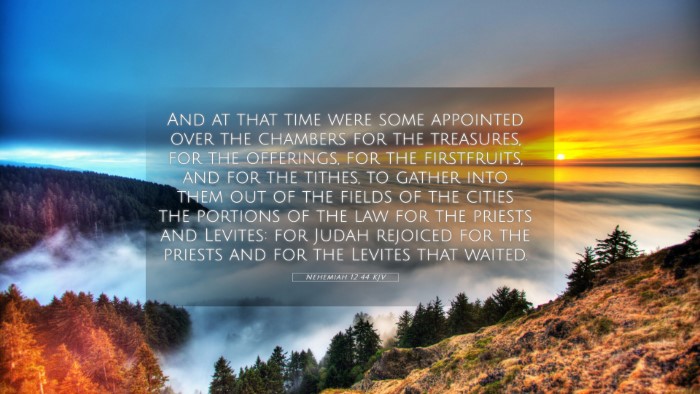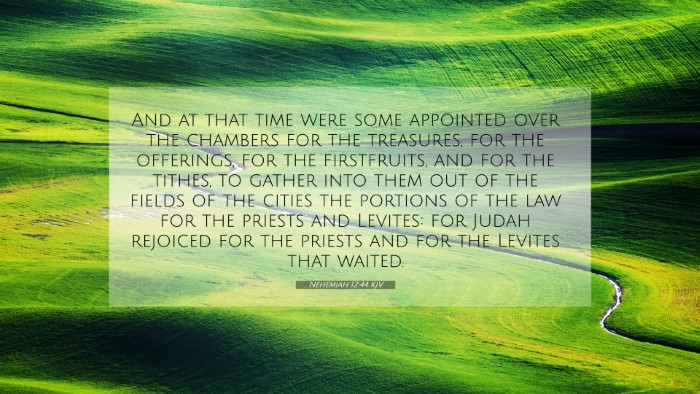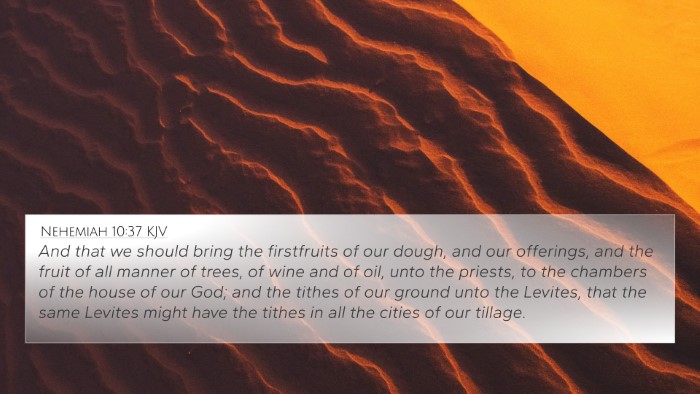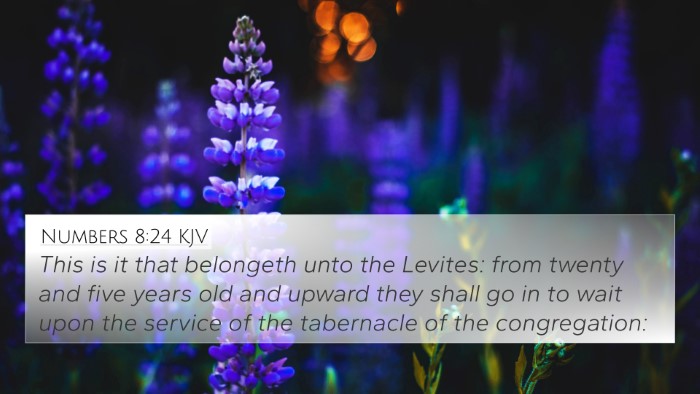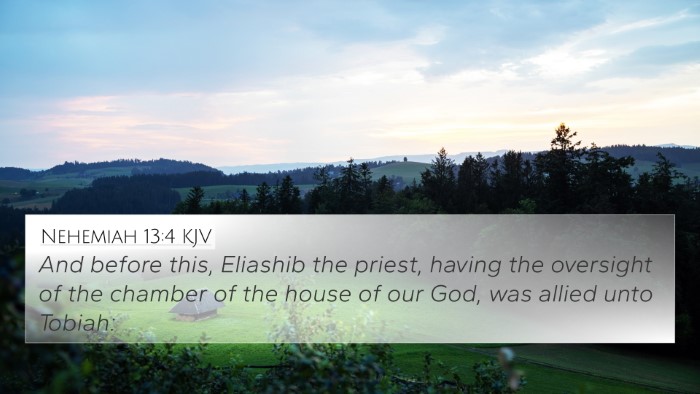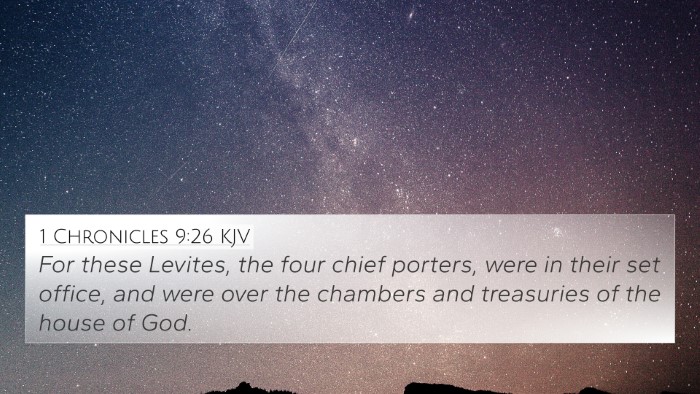Understanding Nehemiah 12:44
Verse: Nehemiah 12:44 states: "And at the same time were some appointed over the chambers for the treasures, for the offerings, and for the firstfruits. And to gather into them out of the fields of the cities the portions of the law for the priests and Levites: for Judah rejoiced for the priests and for the Levites that waited." This verse is part of the narrative detailing the reestablishment of worship and order among the people of Israel after their return from captivity.
Commentary Insights
This verse highlights several critical elements in the organization of the community and their worship practices. The following points summarize insights drawn from public domain commentaries by Matthew Henry, Albert Barnes, and Adam Clarke.
-
Spiritual and Physical Order:
Matthew Henry emphasizes that the appointment of individuals over the treasures represents a significant step towards restoring both spiritual and administrative order in Jerusalem. It depicts a well-structured community where resources are managed effectively to support religious activities.
-
Provision for the Priests and Levites:
Albert Barnes notes the importance of the chambers for treasures, as they held offerings designated for the priests and Levites who ministered in the temple. This indicates the people's commitment to support their spiritual leaders and ensure the continuity of worship.
-
Rejoicing in Leadership:
Adam Clarke observes the communal joy in recognizing the roles of priests and Levites. The passage indicates a collective appreciation and value placed upon spiritual leadership, which is vital for a thriving religious atmosphere.
-
The Gathering of Offerings:
Henry elaborates that the gathering of offerings from the fields signifies the community's responsibility to bring forth their best for God. It reflects the understanding that worship involves action and tangible expressions of faith.
-
Law of Firstfruits:
Barnes points out the significance of the firstfruits mentioned in this verse. This practice aligns with biblical teachings about dedicating the first and best of one's harvest to God, emphasizing the principle of prioritizing God in all aspects of life.
-
Community Participation:
Clarke remarks on the communal effort in worship, where all Israel is engaged in providing for the needs of the temple. This shows a unity in purpose and action, reinforcing the idea that worship involves the entire community.
-
The Role of Nehemiah:
Henry highlights Nehemiah’s leadership and his role in organizing and appointing these leaders. His governance is critical in restoring the worship practices and ensuring that the community is aligned with God's commands.
Cross-References and Their Relevance
Nehemiah 12:44 has several cross-references that provide deeper insight into its meaning and context:
- Malachi 3:10: Discusses bringing the tithes and offerings to God’s storehouse, paralleling the gathering of offerings in Nehemiah.
- Hebrews 7:5: Talks about the roles of the Levites in receiving tithes, affirming the importance of financial support for spiritual leaders.
- Exodus 23:19: Refers to the firstfruits of the land being dedicated to the Lord, directly connected to the practice mentioned in Nehemiah.
- 1 Chronicles 26:20: Provides an account of the duties of the treasurers, relevant to the arrangement of treasures in Nehemiah’s time.
- Leviticus 27:30: Discusses the law regarding tithes, which relates to the dedication of agricultural produce to God.
- 2 Chronicles 31:4: Highlights the reforms in Judah regarding offerings and support for the priests and Levites, similar to the intentions expressed in Nehemiah.
- Matthew 6:21: States "For where your treasure is, there will your heart be also", emphasizing the spiritual significance of how one uses their resources.
Conclusion
Nehemiah 12:44 encapsulates key themes of worship, community support, and the importance of spiritual leadership within the context of restoring Jerusalem after exile. Through careful cross-referencing with other Biblical texts, one can appreciate the depth of its message regarding dedication to God and communal unity.
For those seeking to understand the richness of scripture, cross-referencing Biblical texts offers valuable insights. Tools for Bible cross-referencing, like a Bible concordance or a Bible cross-reference guide, can facilitate your exploration of connections between Bible verses. They are essential for uncovering thematic Bible verse connections and engaging in comparative Bible verse analysis, enhancing your reading and studying of the Word.
